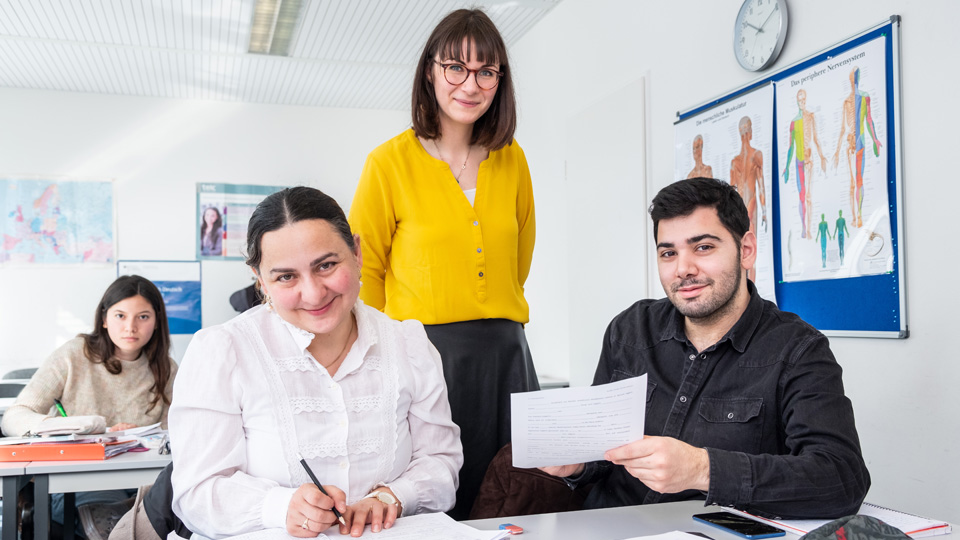German for professional purposes ,
The vocational language courses are a broad, needs-oriented range of courses for integration into the labour market. Building on the integration courses, they prepare migrants and refugees for the working environment in Germany.
Course structure
Basic course
The basic structure of the vocational language courses is made up of the basic course. Here there is a fundamental distinction between three types: B1 to B2, B2 to C1. Language courses with the target language level C2 are currently being developed.
The basic courses focus on the attainment of German language skills for all professions. These skills are taught using general content from the world of work. The courses are designed for a group size of at least 15 participants. Smaller groups are also possible in rural regions.
The teacher regularly records the participants' learning progress in writing and evaluates it together with them at the end of the course. Each course ends with a certificate examination. The certificate obtained is very helpful for the participant's further occupational development.
Special courses
In addition, various special courses are offered:
- Courses for people who are undergoing the recognition procedure for academic medical professions and specialist health care professions
- Courses with specialist content in various subject areas in the commercial, technical and retail sectors
- Courses with the entry level A1 and A2 for participants from the integration course who have not reached level B1
Who can take part?
General conditions
You need to meet the following requirements to take part in the vocational language course:
- You have a migration background and need further language qualification. This is the case for immigrants from third countries, citizens of the EU and Germans with a migration background.
- You have already completed an integration course and/or already speak German at A1, A2, B1, B2 or C1 level according to the Common European Framework of Reference (CEFR) for languages. In order to attend the courses with a target language level below B2, you have to have previously attended an integration course and taken but not passed the German Test for Immigrants (Deutschtest für Zuwanderer).
- You need to be registered as a job seeker and/or as a rule receive benefits in accordance with Book II of the Social Code (SGB II – Hartz IV) or Book III of the Social Code (unemployment benefit).
- You are looking for a training position or are already in training.
- You are currently undergoing the recognition procedure for your vocational or training qualification.
Participation as an employee
If you are already in employment, you can take part in the vocational language course. The requirement is that you do not yet have sufficient language skills to manage your future everyday working life.
Special groups
Persons with discretionary leave to remain pursuant to § 4 para. 1 sentence 2 no. 2 of the German language promotion ordinance (DeuFöV) who do not have access to an integration course do not have to provide evidence of a German test for immigrants in order to participate. For them, a need for further language qualification is fundamentally assumed.
For asylum seekers (with temporary permission to stay) in accordance with §§ 4 para. 1 sentence 3 DeuFöV, a need for further language qualification is fundamentally assumed (45a para. 2 sentence 3 no. 1 of the Residence Act (AufenthG)). Persons from countries of origin with good prospects of remaining are eligible to participate. These currently include Afghanistan, Eritrea, Somalia and Syria (as of January 2022).
Costs of participation
Participation in the vocational language course is fundamentally free of charge. If your taxable annual income is over €20,000, you pay a cost contribution of €2.32 per teaching unit (50% of the reimbursement of costs). For a course with 600 teaching units, that makes a total of 1,392 Euros. The cost contribution can also be paid by your employer.
If you successfully complete the examination, you can apply for a refund of 50% of the cost contribution. The application form can be found under "Downloads".
Eligibility
As a rule, the employment agencies and job centres decide on eligibility. Please contact your adviser. They also know which language schools offer courses and whether special courses are an option for you.
If you are already in employment or training or in the recognition procedure and do not receive benefits under Book II or Book III of the Social Code, you can apply directly to the BAMF for eligibility to participate.
An overview of direct contact partners ("List of contact persons") and application forms can be found under "Downloads".
Background
Job-related language promotion for people with a migration background is a standard language promotion instrument of the Federal Government in accordance with § 45a of the Residence Act. It builds directly on the general language integration courses.
Both general and job-related German language promotion are coordinated and carried out by the Federal Office for Migration and Refugees. However, the departmental responsibilities are divided between the Federal Ministry of the Interior (BMI) and the Federal Ministry of Labour and Social Affairs (BMAS). While the BMI is responsible for general language promotion up to B1 (integration courses), the promotion of the job-related language courses is the responsibility of the BMAS.

